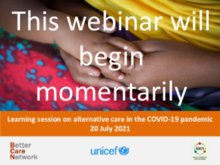As India recovers from the second wave of the ongoing COVID-19 pandemic, it has resulted in a severe impact on children and families. According to the Ministry of Women and Child Development, GoI, 577 children have been orphaned since May 2021. The National Commission for the Protection of Child Rights (NCPCR) has shared that over 9,3000 children have lost parents or have been abandoned since the beginning of the COVID-19 pandemic last year.
In the backdrop of deaths in families, extended periods of shutdown and loss of employment opportunities, the pandemic has pushed families to the brink of crisis. Children face an increased risk of abuse, neglect, violence and exploitation, leading to separation. Practitioners, researchers and policymakers highlight the importance of care of children in a family environment by keeping families together and ensuring services for family-based alternative care.
This webinar featured presentations and discussions from practitioners who have experience of working on alternative care (short term and long term) and prioritising family-based care in emergency settings that could be helpful for practitioners in India as they plan a response for children who have lost parents to COVID-19. The webinar was presented particularly for practitioners and stakeholders in India, to enable them to hear how those in other countries impacted by COVID-19 have addressed the challenges to children’s care, including loss of parental care, support to parents and other caregivers who are facing multiple challenges in their caregiving, addressing the support needs of extended families who are taking on the care of children and ensuring children are not placed in residential care, among other things.
Speakers shared lessons learned from the following programs and interventions:
- Parenting messaging videos and community-level work, in particular to relieve parental stress and prevent violence in the home (Nepal, Save the Children)
- Cash support added to case management with a focus on addressing the prevention of separation and addressing loss/lack of livelihood (Cambodia, Family Care First| REACT)
- Gatekeeping in the context of COVID - tracing extended family for kinship care arrangement, psychosocial support to children and families in kinship care and families where children have lost one parent (India, CINI)
- Emergency foster care practice in COVID context (Bulgaria, Hope and Homes for Children)
- Adaptation to virtual case management due to COVID to support reintegration into family care from residential care (Kenya, CTWWC)

